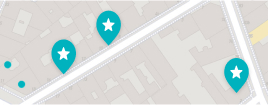HUTONG
Go there and contact
Hutong are the heart of the Chinese capital. These narrow streets, typical of the urban tradition of Beijing are some of the vibrant testimonies of the past and windows of daily life pékinoise: a mixture of old (architecture, atmosphere, gardens, temples) and modern (television antennas and perched parables on the old roofs of baked tiles, sometimes luxurious cars parked along the houses), popular (open doors on back of kitchen, old Chinese dorant in the sun, grannies m seated on mini stools, sellers at circulant auction perched on tricycles) and international (seats of Hong-Kongaises companies, karaokés and private clubs). Who did not walk in these hutong did not see the true Beijing. Most of these streets date back to the Yuan period, and the Qing and Ming dynasties perpetuated this form of urban fabric. With the opium wars and increasingly important contact with the West, a modern road gradually substituted into the traditional streets of Imperial Beijing.
Siheyuan 四合院: these traditional houses nested at the bottom of the hutong, the architecture derived from the designs introduced by Kubilai Khan, when he made Dadu (former name of Beijing) the capital of the Sino-Mongolian empire. The construction of a siheyuan is so special that it deserves some clarification. It is a single-foot house, composed of four buildings that form a closed enclosure on itself and open all on a square courtyard (hence the name "square courtyard" they are commonly given). From the outside, the often red lacquered door opens to the south through the grey walls and, after a quarrel (whose aim is to deceive the bad spirits, which, knowing that the right to be moved to them, breaks its nose over the wall), is finally between a second door in the house.
Right at the bottom of the courtyard facing south is the main building where usually the head of the family lived. In the two side buildings, the brothers and sons who had their own families were found. You could count up to six families who cohabited in a siheyuan. The fourth building opening to the north and closing the courtyard was traditionally reserved for domestic servants. In the courtyard, one or two trees, acacia, jujubier, grenadier, plum or persimmon, a grape grape or glycine, and also flowers are often noted: jasmine and peonies, and sometimes a aviary with pigeons or an aquarium.
The importance of siheyuan varies according to the social class of its inhabitants. The Chinese roofs, with nicely-spotted edges, are enough to overcome walls and form a kind of awning that can shelter the sun. Today some siheyuan, in hutong not threatened by destruction, are restored and stormed by Westerners.
Along the hutong, the small siheyuan parallel the wangfu (princely palate). Beijing included about sixty fortified palaces under the Qing, but these exuberant architectural ensembles were transformed into schools, hospitals or factories during the Cultural Revolution. These large houses placed on stone terraces were preceded by a sort of awning extending the roof, supported by columns. These are the spaces between the so-called jian columns used to measure their importance. For example, if the palaces of high-ranking princes could count up to seven jian, those of senior officials had only five or three, and most of them, only three. Today, the municipality seeks to preserve these unique legacies, despite its persistence in the rapid destruction of the old neighbourhoods to replace them with modern shops, hotels and other urbanization projects.
An example of a beautiful house to visit, if you have time: The Prince Gong Palace (Gong WangFu 恭王府), built under the Qing, which included one of the covered theatres of the capital, is open to the public every day (at No. 17 Qianhai Xijie, in the Houhai district, take bus 111). This palace has a total surface area of 32 000 m ² and was built to serve as a residence for He Shen, one of the favourites of Emperor Qianlong. Recently renovated, after being closed for many years, this palace is a small gem.
It is also in this neighbourhood that the best preserved hutong are in the capital: The entire tour of the Lacs Lakes, and east of the Tower and the Drum towers take place in the small labyrinthine alleys that deserve a long walk.
For a year or two, travel agencies have begun to exploit hutong, offering visites tours. This solution can be valid for those who do not have time to explore these neighbourhoods on foot. Independent pousse are directly offering their services on the shores of Lake Shishahai.
Did you know? This review was written by our professional authors.
Book the Best Activities with Get Your Guide
Members' reviews on HUTONG
The ratings and reviews below reflect the subjective opinions of members and not the opinion of The Little Witty.
Find unique Stay Offers with our Partners


